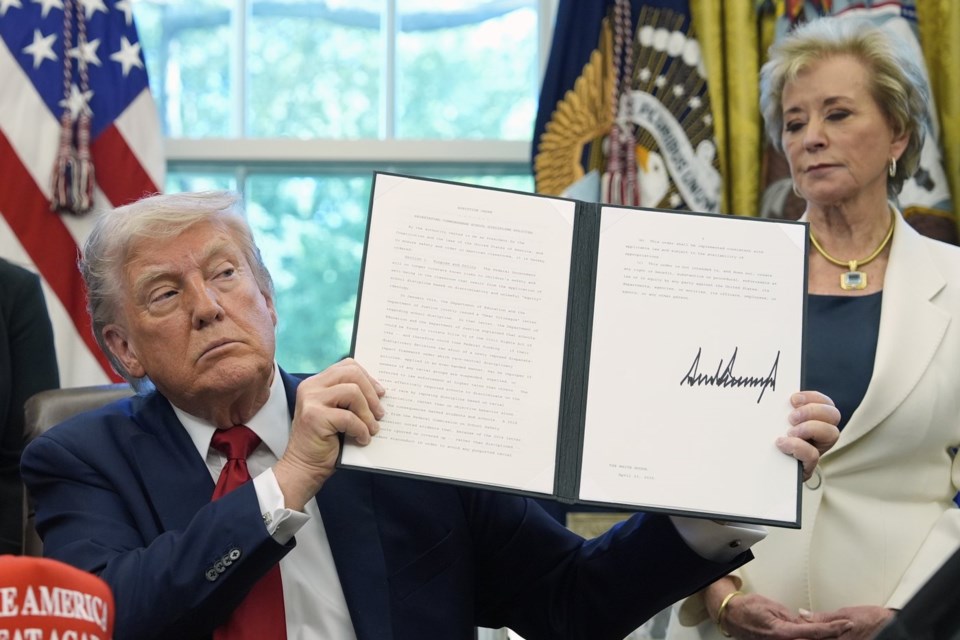CONCORD, N.H. (AP) — A federal judge on Thursday blocked Trump administration directives that threatened to cut federal funding for public schools with diversity, equity and inclusion programs.
The ruling came in a lawsuit brought by the National Education Association and the American Civil Liberties Union, which accused the Republican administration of violating teachers’ due process and First Amendment rights.
In February, the U.S. Education Department told schools and colleges they needed to end any practice that differentiates people based on their race. Earlier this month, the department ordered states to gather signatures from local school systems certifying compliance with civil rights laws, including the rejection of what the federal government calls “illegal DEI practices.”
The directives do not carry the force of law but threaten to use civil rights enforcement to rid schools of DEI practices. Schools were warned that continuing such practices “in violation of federal law” could lead to U.S. Justice Department litigation and a termination of federal grants and contracts.
The lawsuit argued that the orders were “unconstitutionally vague,” an issue underscored in the ruling from U.S. District Court Judge Landya McCafferty.
She said the April letter does not make clear what the department believes a DEI program entails or when it believes such programs cross the line into violating civil rights law. “The Letter does not even define what a ‘DEI program’ is,” McCafferty wrote.
The judge also said there is reason to believe the department's actions amount to a violation of teachers' free speech rights.
“A professor runs afoul of the 2025 Letter if she expresses the view in her teaching that structural racism exists in America, but does not do so if she denies structural racism’s existence. That is textbook viewpoint discrimination,” McCafferty wrote.
States were given until the end of Thursday to submit certification of their schools’ compliance, but some have indicated they would not comply with the order. Education officials in some Democratic-led states have said the administration is overstepping its authority and that there is nothing illegal about DEI.
The lawsuit filed in March argues the Feb. 14 memo, formally known as a “Dear Colleague” letter, would limit academic freedom by dictating what students can be taught.
The memo said schools have promoted DEI efforts at the expense of white and Asian American students. It dramatically expands the interpretation of a 2023 Supreme Court decision barring the use of race in college admissions to all aspects of education, including, hiring, promotion, scholarships, housing, graduation ceremonies and campus life.
The memo faces another challenge from the American Federation of Teachers and the American Sociological Association, which has asked a federal court in Maryland to stop the department from enforcing it.
Both lawsuits argue that the guidance is so vague that it leaves schools and educators in limbo about what they may do, such as whether voluntary student groups for minority students are still allowed.
President Donald Trump’s education secretary, Linda McMahon, warned of potential funding cuts if states did not return the form by Friday.
In a Tuesday interview on the Fox Business Network, McMahon said states that refuse to sign could “risk some defunding in their districts.” The purpose of the form is “to make sure there’s no discrimination that’s happening in any of the schools,” she said.
The April directive asked states to collect the certification form from local school districts and also sign it on behalf of the state, giving assurance that schools are in compliance with Title VI of the Civil Rights Act of 1964.
Schools and states are already required to give assurances to that effect in separate paperwork, but the new form adds language on DEI, warning that using diversity programs to discriminate can bring funding cuts, fines and other penalties.
The form threatens schools’ access to Title I, the largest source of federal revenue for K-12 education and a lifeline for schools in low-income areas. ___
Binkley reported from Washington.
___
The Associated Press’ education coverage receives financial support from multiple private foundations. AP is solely responsible for all content. Find AP’s standards for working with philanthropies, a list of supporters and funded coverage areas at AP.org.
Holly Ramer And Collin Binkley, The Associated Press



